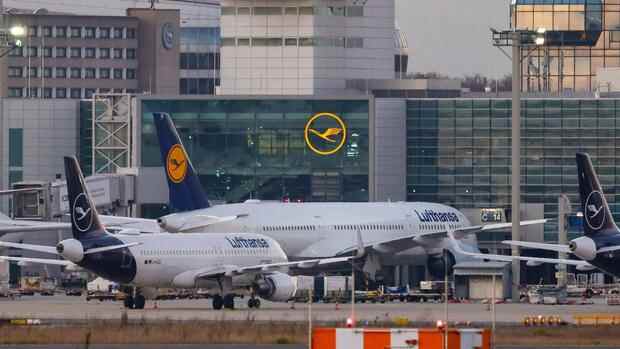Berlin, Frankfort With rare unity, the German aviation industry criticizes Germany’s behavior in the final negotiations for the European climate program “Fit for 55”. In a letter to Federal Minister of Economics Robert Habeck (Greens), the heads of the German airline Lufthansa and the two major German airports in Frankfurt and Munich call on the minister to influence the plans of the EU Commission again.
With the unusual push for higher taxes, Carsten Spohr (Lufthansa), Stefan Schulte (Fraport) and Jost Lammers (Munich Airport) want to nip in the bud the threatening competitive disadvantages compared to non-European airlines and airport hubs such as Doha, Dubai or Istanbul.
If airlines do not have to fill up with synthetic fuels at airports outside the EU, they can offer their flights more cheaply, since conventional kerosene will remain significantly cheaper for a long time to come.
Top jobs of the day
Find the best jobs now and
be notified by email.
In another letter to Habeck and Transport Minister Volker Wissing (FDP), Michael Niggemann, President of the Air Transport Employers’ Association, and trade unionists Stefan Herth, President of the Cockpit Association, and Christine Behle, Vice President of Verdi, warn that the EU plans are a “stimulus package for authoritarian regimes with low environmental and social standards”. Both letters from September are available to the Handelsblatt.
Emissions trading, quotas and taxes are a burden on the industry
“Jobs can only be secured if European airlines remain successful and fly under the same conditions as non-EU airlines,” warned employers and trade unions.
>> Read also: As the Lufthansa wants to fly climate-neutral with solar kerosene
Among other things, the EU Commission wants to stipulate that airlines must initially add two percent climate-friendly, synthetic kerosene to flights departing within the EU from 2025. By 2035, the share should increase to 20 percent and by 2050 to 85 percent.
The problem in the eyes of the industry: There is hardly any synthetic kerosene, also known as SAF. The production capacities have yet to be built. Added to this is the price difference compared to conventional kerosene.
Non-European airlines do not have to add these fuels – at most if they fill up in Europe. Lufthansa and the hub airports in Frankfurt and Munich therefore fear that passengers will increasingly book international connections with foreign airlines such as Emirates via its home airport in Dubai.
The airline from the United Arab Emirates is handling more and more transfer traffic via its hub – without any major climate protection ambitions.
(Photo: Bloomberg)
A European tax based on the model of the German ticket tax should reduce the problems. The tax should apply to the entire flight to the final destination and back, even if the passenger changes planes outside of Europe. The revenue could flow into the production of the sustainable fuel, so the idea of the aviation industry.
At the beginning of April, Spohr, Schulte and Lammers publicly advocated this path for the first time and warned that up to 260,000 jobs within the European aviation industry could be lost with the EU plans.
Habeck is silent, Wissing reacts
Obviously, the warning did not get through to the Federal Ministry of Economics. In any case, the three managers miss “an active strategy by the federal government” in the final negotiations at European level, as they write. Habeck also “unfortunately canceled” a promised phone call with Spohr. The attitude of the ministry leads “to a shift in traffic to the Bosphorus and the Persian Gulf”, Germany threatens to lose “parts of its logistical independence”.
The managers can be sure of the support of at least one minister: Federal Transport Minister Volker Wissing. The FDP politician presented the industry position last week at the meeting of the German Bundestag’s Transport Committee as the ministry’s position, as participants reported afterwards.
The minister explained that it was important to increase the blending rate without distorting competition and announced that his ministry would promote the idea of an air traffic tax at European level.
When asked, Wissing’s spokeswoman pointed out that “coordination within the federal government” would be ongoing on a possible air traffic tax at EU level. In the Council working group of EU finance ministers in Brussels, Germany “proposed the resumption of the discussion on the introduction of a harmonized aviation tax at EU level”.
A spokesman for Economics Minister Habeck pointed out that from 2027 the EU Commission will present a report on the consequences of the decisions every five years. If necessary, there will be adjustments. The government also supports the European Parliament’s proposal to allocate emission certificates free of charge. This rewards the admixture and avoids distortion of competition.
The corresponding quota should expire by 2027. After that, the national states in the EU Environment Council are pleading for “a new form of free allocation of emissions trading certificates for aviation”, as the spokesman went on to explain. Europe wants to promote SAF with certificates by 2030. The federal government is behind this plan, the spokesman continued. The free allocation remains limited, “since emissions trading is not a general funding instrument”.
A European air traffic tax seems to be off the table. There is currently a national aviation tax that the industry has rejected for many years. It was introduced in 2010 to relieve the budget by one billion euros a year.
More: Consumer advocates call for the end of the prepayment rule – passengers should pay at the earliest on departure
